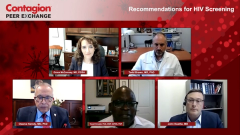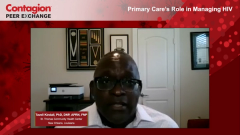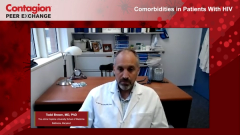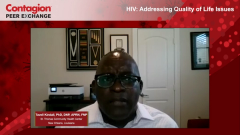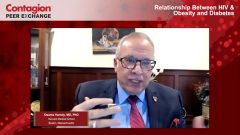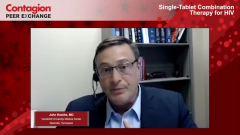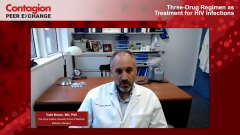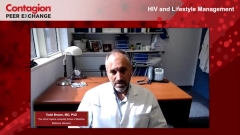
Recommendations for HIV Screening
Recommendations for primary care physicians to help properly identify patients who should be tested for HIV, and an overview of available screening tests.
Episodes in this series

Grace McComsey, MD, FIDSA: Speaking of diagnosing HIV, I’m going to bring Tavell into this, as ID [infectious disease] physicians or providers, we always want primary care providers to think about HIV in the right clinical setting. What are the potential signs or symptoms that a person with acute HIV could present with? If you’re teaching or talking to primary care providers, what do you tell them about when to think about HIV and what tests in that setting should they do?
Tavell Kindall, PhD, DNP, APRN, FNP: Thank you for the question. It’s interesting, I’m a nurse practitioner, and I had a conversation not too long ago with colleagues throughout the state about acute retroviral syndrome or acute HIV infection and talking to them about making sure they understand to include that in a differential when someone’s showing up in some of our urgent care and emergency department settings. Not so much primary care, because they may or may not present there, but sometimes with the acute symptoms, they will show up. Most individuals will have a syndromic presentation, the symptoms are like a bad mono [mononucleosis] or a flu, and patients will usually describe it as like the worst flu they ever had. Symptoms like rash, fever, muscle aches, those kinds of things, sore throat, lymphadenopathy, diarrhea, headache, and a number of the things that show up in a viral syndrome kind of presentation. What happens a lot of times, though, is that no one really thinks this might be acute HIV infection. And certainly, if the right questions are not asked during the history, it may not even be a part of the differential diagnosis, and as a result, the test is not ordered. I think it’s important for providers to start thinking about that, particularly in places with high HIV incidence and prevalence. It could very well be that what you’re seeing is acute HIV infection and not the viral syndrome for which you’d send them home with a Z-Pak [azithromycin].
Grace McComsey, MD, FIDSA: Right. As we always tell trainees, you must think about diagnosing acute HIV. It’s easy to diagnose once you think about it, right?
Tavell Kindall, PhD, DNP, APRN, FNP: Correct.
Grace McComsey, MD, FIDSA: What tests would you order? If you have someone who thought about it, what tests should they order?
Tavell Kindall, PhD, DNP, APRN, FNP: The standard screening tests for HIV, certainly you want to get the fourth generation that’s available, that tests for both antibody and antigen. That is an appropriate test. As I understand it, that test will pick up an infection as early as 2 weeks, so you definitely want to make sure the fourth generation test is the one being used. If you’re looking for viral copies, then certainly the HIV RNA will be an appropriate test to order to see if there is virus circulating in the blood.
Grace McComsey, MD, FIDSA: Thank you for watching this ContagionLive® Peer Exchange. If you enjoyed the content, please subscribe to the e-newsletter so you can receive upcoming Peer Exchanges and other great content. Thank you for listening.
Transcript Edited for Clarity
Newsletter
Stay ahead of emerging infectious disease threats with expert insights and breaking research. Subscribe now to get updates delivered straight to your inbox.

